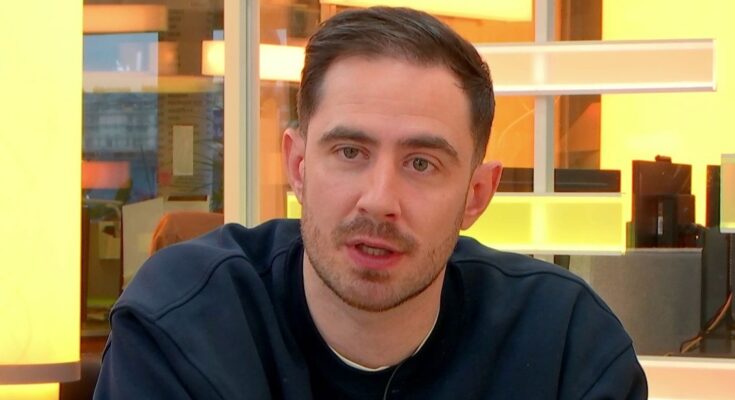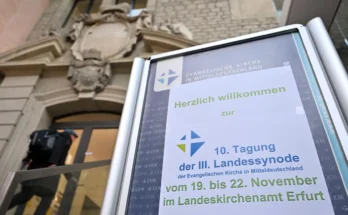Paralyzed after a diving accident, Martin Petit is the author of “Go Where You Fear,” published by Flammarion. On the occasion of “DuoDay” at “La Matinale” on November 20, he recalled his journey as a disabled person, in France where “inequality and deprivation” still exist.
Against the inadequacy of people with disabilities in society, and on the occasion of the national day “DuoDay”, Thursday 20 November, “La Matinale” from franceinfo received Martin Petit, who became paralyzed after a diving accident in 2017. In his book Go where you are afraidhe shares his journey and life experiences as a French disabled person.
This text corresponds to the transcription of the interview section above. Click on the video to watch the full interview.
Everything changes for you after a bad dive one afternoon with friends. You broke your fifth cervical vertebra. When you wake up, you are told that you are paralyzed. Did you understand at that moment that maybe everything was about to change for you?
Martin Petit: I realized it immediately, because once I had an accident on the beach, I was still conscious. I immediately understood that this was something serious. After that, I fell into a mini-coma for two or three days. That’s when I realized that I had quadriplegia, I could see that I was wired everywhere, that my body was no longer responding on its own. And then the doctors and nurses explained to me what happened.
You suffer from what is called “incomplete” quadriplegia. How did this long journey of caring begin?
When you can move your upper body a little like that, you imagine yourself suffering from paraplegia. I suffer from quadriplegia at the C6 and C7 level. There are different degrees of lesions in the spinal cord, so there is more or less damage. I couldn’t use my fingers, which would be a feature of my situation, and I was paralyzed from my chest to my toes. I still have wrist lifts, biceps, shoulders, upper back, and that’s what allows me to have autonomy today. This kind of treatment took several months, a total of eleven months, which is actually quite a short time for a paraplegic. I was able to continue my studies, and therefore get access to accommodation, which sometimes takes a little time, because you have to rearrange your whole environment, sometimes do work, etc. And sometimes, leaving the center can be a little trickier.
Have you ever felt other people’s views change?
The real confrontation, in the eyes of others, is ultimately when we leave the rehab center. There I was actually faced with society’s views, the lack of accessibility and also all the mental burdens that we have to bear in managing our lives as people with disabilities, in a system that is not always easy.
To prepare for this interview, I wanted to delve deeper into our archives, in particular by looking at the oldest reports chronicling the daily life of a disabled person in France, dating back to the 1960s. Have things changed since then?
We’re not going to spit soup, things have progressed, but we recognize there are still a lot of problems. And again, what I want to focus the question on is I realize that this has been going on for sixty years and we are one year away from the Paralympics. At this time, we must also consider our needs so that we can live as equals, and this is a bad play on words with everyone. And it is true that I realize that, sometimes, there are gaps and shortcomings: we will carry out the work and there is no one who will act as a safeguard, who will ensure that the work is done as it should be. And I talk about this example voluntarily. In Bordeaux, they worked on tram tracks at important stops. They actually added steps where there was previously a ramp. So, we should have done better and in the end, we took a step back.
Regarding this question of non-accessibility, what is the most difficult thing for you every day?
I wouldn’t say that this is an isolated situation, it’s an accumulation of all these things throughout the day. We are talking about mental load: this can have bad consequences in the long term, psychologically, because we are always facing difficulties. Yes, you have to be able to survive. We are also here to talk about this because it is important to point out the fact that there are still things we need to move on. We also need to have allies, so let’s surround ourselves with people who share the same desires.
You mentioned the Paralympics taking place in Milan in March. The one in Paris, in 2024, has resonated with you since you testified, you spoke at the opening ceremony. What memories do you keep of him?
Seven years ago, when I was lying in intensive care, I never imagined that I would be able to testify at that time. I think this is wonderful, because personally, there is something very joyful, and telling ourselves that we might as well be on the right and balanced side, in discourse, because we have been given the opportunity to be able to express ourselves. So yeah, it’s something powerful.
But the reality is that we are holding the Paralympics at home, in Paris, in various places in the capital, so we have to take the metro to get there. Metro, public transportation that is not organized, is created, prepared to accommodate people with disabilities. What do you think was missed?
The reality is that only 3% of trails are accessible. It’s true that I don’t have much knowledge about the metro because I couldn’t take it, so I didn’t delve too deeply into the topic. Afterwards, Andrew Parsons, president of the International Paralympic Committee, said at the closing ceremony of the Paralympics that we want to make Paris a celebration and a dream for everyone by making the metro accessible. And it’s true that I’m inclined to say: where do we stand in today’s discussion? Then we often talk from the perspective of Paris, but this can also have an influence in providing an example for other cities, other large metropolitan cities in Europe, in the world.
Click on the video to watch the full interview.



